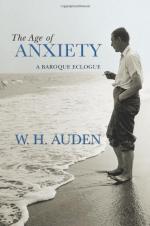|
This section contains 2,460 words (approx. 9 pages at 300 words per page) |

|
In an essay-review of Loren Eiseley's The Unexpected Universe in 1970, W. H. Auden identifies genuine laughter with the "spirit of Carnival" and insists that "when we truly laugh, we laugh simultaneously with and at" [Auden's emphasis]. That is, genuine laughter and the Carnival spirit are both a protest against and an acceptance of human mortality and the contradictions inherent in the human condition. Auden further contends that we feel ambivalent about our mortal limitations and "oscillate between wishing we were unreflective animals and wishing we were disembodied spirits, for in either case we should not be problematic to ourselves." During Carnival, the traditional holidays of license and festivity preceding Lent, laughter resolves this ambivalence, according to Auden, by assuming the dual attitudes of acceptance and protest. The protest element in the traditional Carnival emerges as profanity, mock-aggression, and the inversion of social rank, all of which serve as...
|
This section contains 2,460 words (approx. 9 pages at 300 words per page) |

|


